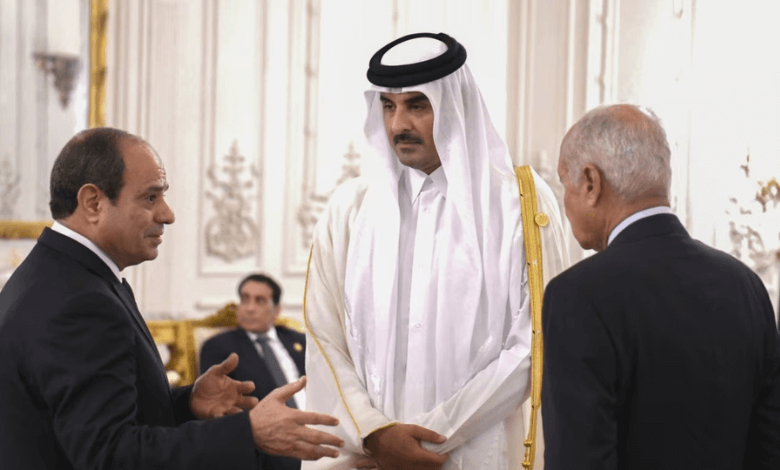How Qatar Turned Into the Essential Mediator in the Middle East in the Israel-Hamas War?
Welcome to have a fascinating look at international relations and GCC and Middle East politics. Qatar has supported the Muslim Brotherhood, a mysterious alliance that has shaped diplomatic landscapes and regional dynamics. Prepare for a thought-provoking journey as we uncover hidden agendas, analyze strategic partnerships, and illuminate the complex power plays in one of the world’s most turbulent regions. Qatar is trying to establish peace and become a big player in the GCC by strengthening ties with UAE and others outside the Brotherhood, understanding diplomacy at its best!
The young and reserved ruler of Qatar is the one with the key to solving the extraordinary hostage crisis in the Middle East. He is neither Israeli nor Palestinian. Sheikh Tamim bin Hamad Al Thani has been determined to make his small nation, which has the third-largest gas reserves and the sixth-highest per capita income in the world, a player in world geopolitics ever since he came to power ten years ago. Even after hosting the World Cup of football and having their once-dependable Russian gas supplies cut off by European officials, he has largely failed to reach the stature he so desperately desires.
The conflict between Israel and Hamas, an organization that owes Qatar money, has given Thani the chance to become more well-known than any other Arab leader in a very long time.
He has a special opportunity to assist in the safe delivery of more than 200 hostages. He is not concerned about a rebellion or a challenge to his authority from political Islamists, in contrast to his neighbors in the area. Rather, he accommodates Islamist militant organizations such as Hamas, in addition to an Israeli trade office and thousands of US troops at the Al Udeid Air Base, from which the US regularly conducts operations in the area.
Without a doubt, Thani is sympathetic to the Palestinian cause. His foreign ministry did not once denounce the violence, but instead “solely” attributed the attack on Hamas to Israel. However, for families who are desperate to reunite with their kidnapped sons, daughters, grandparents, and other loved ones, Doha’s influence over Hamas may be their only chance.
Doha gave refuge to Hamas in 2012 when the group was fighting against the Syrian government in Syria. According to Qataris, the decision was made with US President Barack Obama’s approval and in cooperation with the US government. In addition to giving its leaders sanctuary and a place to organize and negotiate with its Iranian backers, Hamas owes Qatar millions of dollars in annual foreign aid that supports Gaza’s poor, buys electricity, and purportedly finances the organization’s bureaucracy.
So far, Qatar has succeeded in persuading Hamas to release four prisoners, all of whom are female. The official spokesman for Qatar’s Foreign Ministry, Majed Al Ansari, told Foreign Policy, “We remain hopeful with regard to the hostage situation.” “There have been some developments and advancements in the negotiations, particularly when contrasting our initial position with our current one.”
More civilian hostages would be freed throughout the course of this week and the upcoming weeks, a senior official with knowledge of the ongoing negotiations told FP one day prior to the release of two Israelis. The official stated, “It’s moving slower than we expected.” Speaking of the explosion at Gaza City’s al-Ahli Arab Hospital, he continued, “The bombing of the hospital delayed negotiations.” Nonetheless, there has been progress. Initially, Hamas demanded a total swap that included civilians. He attributed the change to Qatar’s ability to mediate disputes and said, “Now they want to release them for nothing.”
Many of Israel’s Western allies think that Thani has far more influence over the group than he is likely letting on. It’s possible that he could put more pressure on its leaders to release the hostages. Israeli Foreign Minister Eli Cohen stated at this week’s UN Security Council meeting that “the international community should call on Qatar, which finances Hamas, to enable the immediate release of the hostages held by the terrorists.” “We have no reason to believe Qatar won’t do it; we know it can exercise influence over Hamas,” EU lead spokesman for external affairs Peter Stano told FP at his Brussels office.
According to a person with knowledge of the ongoing negotiations, Hamas is requesting that Israel cease bombing Gaza in order to apprehend over 200 prisoners who are dispersed throughout the region. Some of these prisoners are under the care of Islamic Jihad, an even more radical armed group, while others are Palestinian civilians holed up in residential areas.
He continued, “Hamas hopes to negotiate a prisoner swap—Palestinian prisoners in exchange for armed Israelis—once the civilians have been freed.” In a related development, the leadership of Hamas declared that it had enough hostages to demand the release of “all our prisoners.”
The people of Qatar are worried that if Israel continues to bomb the area and Hamas believes its days are numbered, negotiations will break down. As the death toll in Gaza rises and hostage deaths are feared, there have been more calls for humanitarian “pauses.” Stops have been called for to save civilian lives by the European Union, and even U.S. Secretary of State Antony Blinken has said they should be considered.
Qatar, however, faces competition from other regional powers eager to appear as if they are leading the charge and demonstrating their relevance to the West.
Read More: Qatar and UAE Building Closer Ties in a Shifting Political Landscape


















